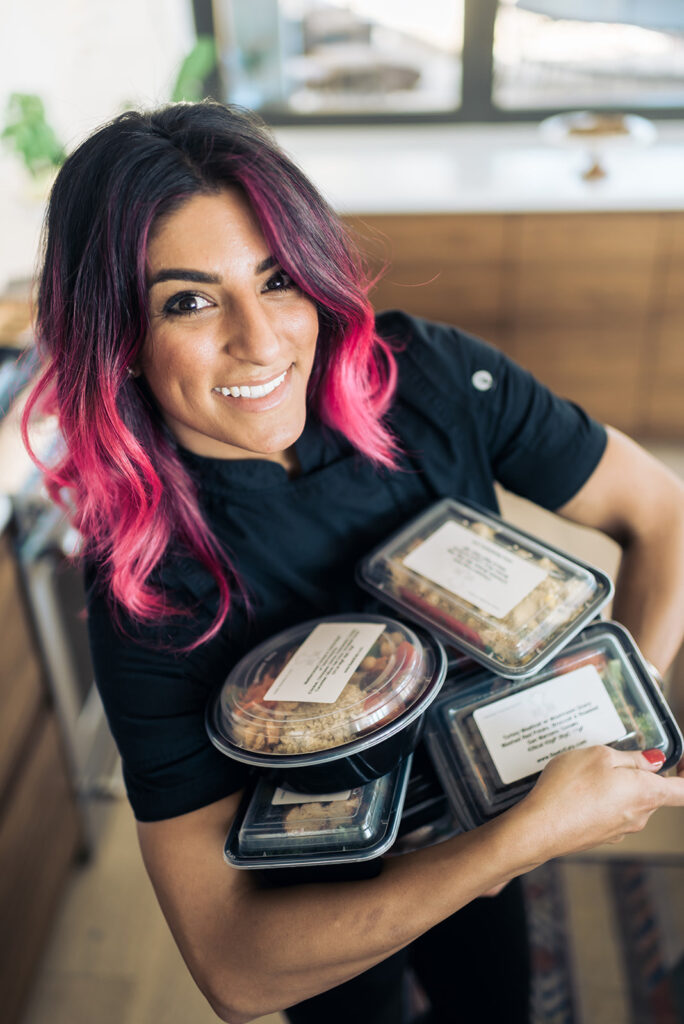At the age of 21, Beeta Mohajeri had her heart set on being a dentist. The promise of financial stability and opportunity to help people drew Mohajeri into the career path, as along with pressures from her family. She was in the midst of her undergraduate education, studying biology. she followed this aspiration all the way to pre-dental school at the University of Washington. At age 26, she graduated pre-dental school. Then, instead of continuing to dental school, she began culinary school. In five short years, Mohajeri’s passions and career had completely changed, and therefore, so did her life.
“I grew up in a Persian house where you can be a doctor, a lawyer, an engineer, a pharmacist. These are your options, right? Being a chef is not a thing. So, it was hard because I was on a path of doing what I was supposed to be doing,” Mohajeri said.
Despite her family pressures, she doesn’t regret it. Not for one second.
Unlike other chefs in a similar field, Mohajeri’s passion for cooking came from eating. The ability to feed herself, her friends, and her family with food she enjoys drew her to pursue the culinary arts as a career. Starting by cooking for friends in college, her introduction to the culinary scene was slow and steady.
“I feel like my passion for the industry comes from my own hunger,” Mohajeri said. ”Like the fact that I want to eat all the time, and I want to eat all these things, and I really feel like the ability to cook anything is kind of like a superpower.”
Growing up in Calgary, Alberta, Mohajeri understood that few people from her small town in Canada “made it big”. Despite her apprehensions, her dedication and passion brought her to the career that she has today. After culinary school, and a short stint in New Orleans, Mohajeri worked for a catering company to get a taste of the culinary scene, only earning around $15 an hour at the age of 27 in Los Angeles. She also worked as a bartender on the side in order to build a social circle.
After very few hourly wage raises, Mohajeri felt her career had gone stagnant. She then pitched herself to a private chef agency, which connected her to clients and allowed her to make $35 an hour. At that stage, her first client was a household name: Simon Cowell, the most famous judge to come out of America’s Got Talent. Working as his private chef for around three years, her name was now known in Los Angeles’ bustling world of entertainment.
Her next client, Russell Wilson, one of America’s star quarterbacks, required her to travel to Seattle often. Continuing to put her name out into the industry, Mohajeri was also working side hustles: offering meal prep to various clients. Then, Covid-19 started. While many industries took a hit, the pandemic only motivated her to focus on where the money was, and more importantly, what excited her. So, she started her own private chef business.
“When I started building my business here, my first big clients were Leonardo Dicaprio and Lenny Kravitz…They say fake it till you make it, right?” Mohajeri said. “Although I love cooking and although cooking is a passion of mine, I have always been very business minded, and I want to live a certain lifestyle.”

Mohajeri’s first clients were anything but conventional: Simon Cowell and Russell Wilson-not to mention Leonardo DiCaprio and Lenny Kravitz. So how did she do it?
“I always think to myself, what helps me get this job? Because it’s a ‘who’s who’ in LA. Who have you worked for? Who have you cooked for?” Mohajeri said. “Nobody cares–I mean, they care how good your food is–but it’s more about the name and how sought after you are because of who you’ve cooked for.”
Mohajeri’s wildly successful business and catering background has not been her only taste of the culinary industry. Her experience in New Orleans at restaurants such as Andrew’s Palace as a line cook provided her with even more exposure to the public culinary world.
The history of the culinary industry has always favored men. Dr. Alexandra Hendley, a professor of sociology at Murray State University explores gender inequality specifically within the culinary world in her book Gender and Food: From Production to Consumption. Hendley states that “starting in the 18th and 19th centuries, male chefs (many of whom worked in royal or aristocratic households) sought to professionalize by distinguishing their work from feminine, domestic, or amateur cooking. Women were even excluded from early guilds and cooking schools” (Hendley 222). This belief in the “chef as masculine” has only prevailed, with women accounting for only 22.8% of chefs and head cooks in 2021, according to the U.S. Bureau of Labor Statistics.
The restaurant industry lived up to its reputation-it was tough. Although not too tough for Mohajeri. With a hard head and strong personality, she appeared to thrive in that environment. She explains it “shaped” her as a chef. Reminiscing on her two years in New Orleans, Mohajeri stated her treatment in the kitchen as a fact. She didn’t appear angry nor hurt; rather, her explanation almost seemed like it had been told thousands of times before.
“[The chefs] are just yelling, and they do it specifically to try to get you out of there because they don’t think you’re tough. They don’t think you can keep up with the other men. But I am my father’s daughter. I’m very hard headed and have an A-type personality. So to me, it was kind of like a game,” Mohajeri stated.
“A game.” After talking with so many chefs, I don’t know many who would describe the back-of-house environment as “a game.” Perhaps Mohajeri’s attitude is in part why she has made it this far and has become this successful in such a cutthroat industry. Or maybe it’s simply because of her food and work ethic. Regardless, Mohajeri now averages around half a million dollars a year through her private chef business and is well known within the private chef world. She has a commercial kitchen, five other chefs who work for her full time, and even a series of meal prep vending machines throughout Orange County.
“Maybe I had the look, maybe I was available, maybe I worked harder than somebody else. I always say, ‘I don’t know that I’m a better chef than the next guy, but I will probably outwork them.’”
Mohajeri’s restaurant days are behind her now. Despite attending culinary school and working within almost all facets of the culinary industry, her status as a full time private chef is still somewhat questioned. Within the culinary industry, a sort of hierarchy prevails. Daniel Hernandez, food editor at the LA Times, explains this hierarchy as he sees it today.
“One of the ugly and mean parts of the food industry is that there is this kind of cultural and social hierarchy. Private chefs are usually relegated to a very marginal part of that. They’re often not even considered chefs as people who develop or make recipes,” he stated.
Line cooks and other back-of-house staff, primarily immigrants, rarely get the recognition for the genius behind a dish. If it isn’t the person cooking the food, or a person creating a recipe, what constitutes a “real chef” remains the prevailing question.
“The restaurant chefs don’t consider private chefs to be ‘real’ chefs,” said Mohajeri. “As a line cook in a restaurant, you are cooking somebody else’s menu, and you’re doing the same thing over and over again. So you go in there, and nobody knows who you are, right? There’s no proper compensation, and then it’s the executive chef who puts his name on something, who’s getting like, ‘oh, he’s the great chef.’ Yeah, he wrote the menu and created the item, of course. But it’s the line cooks who are doing all the work. A private chef, in my opinion, is to be considered a true chef.”
Hendley writes that “chefs experience status insecurity and have to constantly engage in boundary work to address who exactly is a chef and whose cooking should be valued.” The “value” of cooking is even a question itself–how is it measured? Measured by whom? Critics, the public, and fellow chefs themselves put their two cents into what is “good” and what isn’t, but the subjectivity of “good” is hardly something tangible. As a result, who gets recognized and praised reflects more than just skill or creativity-it reflects broader social dynamics like visibility and representation.
“It’s a different world to be in, and it is a man’s world, like the very world of the chef’s industry is a man’s world,” Mohajeri said. “So to come here and kind of make a name for yourself, it’s not impossible, but it’s not easy.”


